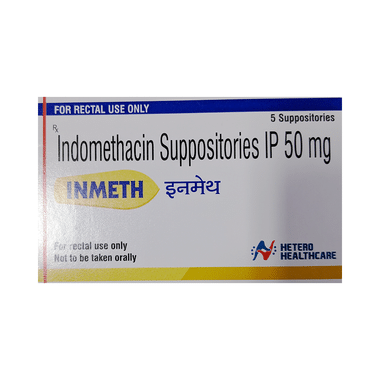-
Inmecin 50mg Tablet (Rs.85)
Composition: Indomethacin (50mg)
All Details About Inmeth Suppositories
Find out detailed description, uses, directions of use, side effects, warnings and precautions, frequently asked questions about Inmeth Suppositories
Description:
Inmeth Suppositories is a type of nonsteroidal anti-inflammatory drug (NSAID). It has analgesic, anti-inflammatory properties. It helps with lowering pain, swelling, and inflammation. Inmeth Suppositories works by stopping the body from making certain chemicals called prostaglandins, which cause pain and swelling.Employ Inmeth Suppositories in the dose and duration prescribed by your doctor. It should be inserted as directed, preferably at the same time each day. Elderly patients or those with kidney or liver impairment should consult a doctor, as they may modify the doses accordingly.
Ordinary side effects of Inmeth Suppositories include headache, dizziness, dyspepsia, and nausea. Not everyone should experience the same side effects, they can differ. Discontinue use and consult a doctor if severe side effects, such as rectal bleeding, vision changes, or gastrointestinal discomfort, occur.
Avoid use if you have gastrointestinal ulcers, severe liver or kidney issues, uncontrolled heart disease, or NSAID allergies. Elderly patients and those with cardiovascular or renal conditions require close monitoring. It is contraindicated during the third trimester of pregnancy and not recommended while breastfeeding. Tolerants with anal or rectal conditions should use caution due to potential irritation.
Uses:
Directions For Use:
Remove the wrapper from the suppository before inserting it. Retain lying down for about 15 minutes after insertion so that the suppository does not come out before it melts.Side Effects:
Most side effects do not require any medical attention and disappear as your body adjusts to the medicine. Consult your doctor if they persist or if you’re worried about themOrdinary side effects of Inmeth
- Rectal pain
- Rectal itching
- Rectal discomfort
- Inflammation of the rectum
- Burning sensation
- Tenesmus (increased urge to pass stools)
- Rectal bleeding
Warning & Precautions:
FAQs:
What should I do if I experience irritation after using Inmeth Suppositories?
Can Inmeth Suppositories affect other medications?
Are there dietary restrictions while using Inmeth Suppositories?
Is it safe to use Inmeth Suppositories if I have a history of cardiovascular disease?
Written by:
Dr. Lokanish
M.B.B.S.
Reviewed by:
Dr. Sureshbabu Yadav
M.B.B.S., DIP.DIAB, F.R.S.H
Disclaimer:
Getomeds primary intention is to ensure that its consumers get information that is reviewed by experts, accurate, and trustworthy. The information and contents of this website are for informational purposes only. They are not intended to be a substitute for professional medical advice, diagnosis, or treatment. Please seek the advice of your doctor and discuss all of your concerns about any disease or medication. Do not disregard or postpone seeking professional medical advice because of something you read on Getomeds. Our mission is to support, not replace, the doctor-patient relationship.
